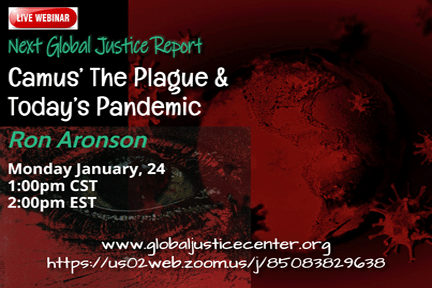Talk: Camus’ The Plague & Today’s Pandemic [] Center for Global Justice
Event Category: All Events, Learning/Education, and Presentations/Discussions
-
Monday, January 24, 20221:00pm CST – 2:00pm EST
Ron Aronson
Albert Camus’ The Plague became the book of the pandemic year 2020-21 because of its 1940s fictional story of bubonic plague menacing the Algerian city of Oran. Philosopher Ron Aronson will discuss its relevance for our times. The book was recently reprinted in several languages, becoming a best-seller in Italy during the height of the pandemic there. More than 1000 articles have been written about the relationship between this book and our plague during the last 2 years.
While Camus’ Plague ignores women and Arabs, and mainstream commentaries today such as in the New York Times insist on seeing “absurdity” as Camus’s main message, he himself thought he was allegorizing the Resistance to the German Occupation. His good friend at the time, Jean-Paul Sartre, had no problem seeing the book’s central message as being about solidarity and slow, patient, unheroic collective work of fighting the disease threatening the whole community. This message fits strikingly with the theme of “all in it together” that became so prominent early in 2020 and led naturally to the George Floyd uprising.
Ronald Aronson is Prof. Emeritus at Wayne State University and the author of Camus and Sartre: The Story of a Friendship and the Quarrel That Ended It and the Camus entry of the Stanford Encyclopedia of Philosophy–https://plato.
stanford.edu/entries/camus/. His most recent book is We: Reviving Social Hope.
What we do The Center engages in local community support and outreach to promote and advance initiatives and movements toward social justice, grassroots empowerment and democracy, and environmental sustainability. It is also devoted to critical analysis of the processes and impacts of globalization, both local and international. The Center works to develop alternative socio-economic systems that conserve and share the world’s cultural, economic, and environmental resources for the benefit of humankind.
-
-


